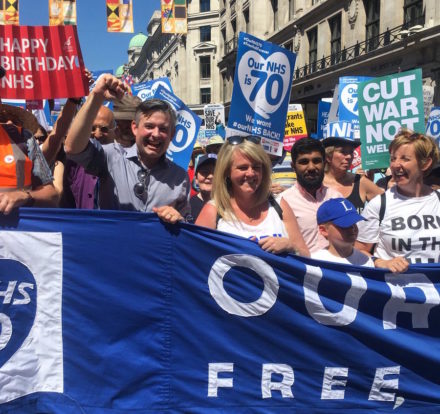
This piece was commissioned by guest editor Jon Ashworth.
The National Health Service is the greatest single collective achievement of working people across the United Kingdom, so it was fitting that the week of its 70th birthday was marked by mass demonstrations in both London and Belfast.
On 5th July 1948, Nye Bevan launched the NHS around three core principles – that it would be comprehensive, universal and free at the point of delivery. The socialist axiom, that we each pay in what we can and take out what we need, was finally to be put into practice in Britain. Although it took a Labour government to act as midwife, the NHS was conceived and raised by the concerted will of working people throughout these islands. It is the envy of the world. Carrying the banner at the front of Saturday’s demonstration, Andre Lewis, president of the Grenada Trades Union Council remarked: “The NHS is a beacon of hope internationally. You must fight to defend it.”
Over 50,000 people assembled and marched in blistering heat on Saturday for the #ourNHS70 celebration. Called by Health Campaigns Together (HCT) and the People’s Assembly, alongside all the major trade union bodies, the aim was to build on the successes of previous NHS marches, cut across Tory rhetoric on the NHS and build a movement that fights back against cuts and privatisation at every level.
The march assembled outside BBC Broadcasting House and descended upon Whitehall. Campaigners, politicians and celebrities lined up behind the NHS banner and were led by NHS workers on megaphones to chants of “Whose NHS? Our NHS!”, “Public Health Not Private Wealth!” and “Tories want to privatise, we say no, RENATIONALISE!”.
In March 2017, our historic NHS demonstration helped reshape the political narrative, which Theresa May foolishly overlooked when she called the snap election. This year, we marched at an equally significant juncture. As Labour seeks to engage NHS campaigners in a conversation about the kind of legislation the government-in-waiting needs to bring forward, to drive market forces out of our health care, the demonstration was an opportunity to unite the fight for the NHS around clear political demands.
At the closing rally, Jon Ashworth’s promise to the crowd that a Labour government led by Jeremy Corbyn would end cuts, austerity and privatisation was met with rapturous applause. He also made the announcement that Labour will seek to bring a bill that seeks to “restore, reinstate and renationalise the NHS”.
For those of us on the frontline, this is a very positive step forward. NHS underfunding has become politically toxic for the Tories. While the pace of privatisation has plateaued, the internal market remains the structural barrier to re-founding the NHS on socialist principles. The call later came from Jeremy Corbyn for an NHS “run, operated and paid for, by the public, for the public, in public hands”, and the Labour leader reiterated his commitment to abolishing the internal market.
Any attempt to bring forward a bill that calls for one NHS, as opposed to hundreds of competing providers, and sets out a socialist plan for public health and social care should be welcomed by campaigners. But future legislation alone is not enough. As long as Theresa May’s minority government staggers along, our services are under attack. NHS workers are being privatised by the back door. Patients are dying in corridors. Life expectancy in working-class areas is declining. Any bill from Labour should also be a tool to inspire and mobilise the millions who work for and use our NHS. It should help build a popular movement that accelerates the demise of this age of austerity and its Tory administrators and see in a new era; a Labour government that puts socialist ideas into practice.
During the closing rally, HCT secretary and junior doctor Aislinn Macklin Doherty called on the crowd to harness its collective power. HCT has launched an app that connects people to their local campaign groups. Joining up those fighting for local services with NHS workers will be crucial for building such a movement and amplifying the loudest and largest collective voice, demanding one universal, comprehensive and free at the point of use NHS.
Jacqui Berry is an intensive care nurse and an officer at Health Campaigns Together.




More from LabourList
‘Council Tax shouldn’t punish those who have the least or those we owe the most’
Two-thirds of Labour members say government has made too many policy U-turns, poll reveals
‘Two states, one future: five steps on the path to peace for Israelis and Palestinians’